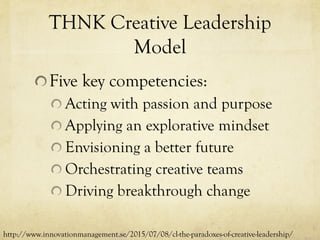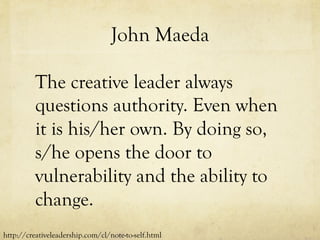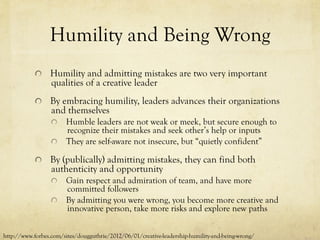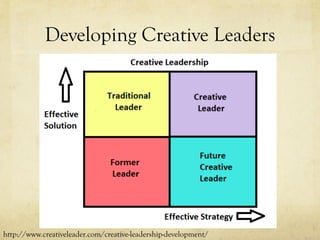Chapter 7: Creative Leadership
- 1. Creativity#7: Creative Leadership Tathagat Varma Knowledgepreneur http://thoughtleadership.in
- 2. IBM 2010 Global CEO Study: Creativity selected as the Most Crucial Factor for Future Success https://www-03.ibm.com/press/us/en/pressrelease/31670.wss
- 3. Problem Solving Creative Leadership: Skills that Drive Change – De Gerard J. Puccio et al
- 5. However, reality is broken!
- 6. What is Creative Leadership? Creative leadership is the combination of creativity (the ability to generate ideas) with leadership (the ability to execute them through the actions of others). What separates creative leaders from non- creative leaders is their ability to generate and execute innovative ideas. Traditional leaders tend to execute “tried-and-true” strategies such as cost-cutting or product extensions, but they rarely disrupt their industries or create new product categories. http://www.creativeleader.com/creative-leadership-development/
- 7. Creative Leadership is a set of sought after skills that have been forged by the digital economy, where the pace of change is fast and furious, and disruption can come from any angle. Creative leaders inspire, cultivate, and implement imaginative solutions that can redefine an organization and ignite meaningful change. http://parttime.syr.edu/bps/creative-leadership/
- 8. Creative leadership is built on the idea that everyone at every level in the organization is a leader; that leaders must know themselves, alert to their failings and graces, to better serve the organization; and that only by mastering complexity – both human and organizational – will leaders be able to achieve alignment. http://www.forbes.com/sites/dougguthrie/2012/06/01/creative-leadership-humility-and-being-wrong/
- 10. 9 Rules of Creative Leadership It’s not about your creativity. It’s about your team’s creativity You don’t need to be creative. But you need to Understand creativity Diversity Identify strengths and weaknesses on your team Trust your people Embrace failure Encourage debate Champion ideas Make ideas come true https://theleadershipnetwork.com/article/innovation-management/creative-leadership
- 11. Six Pillars of Creative Leadership Self Business Partners People The Enterprise Products Market and Society https://www.berlin-school.com/creative-leadership#creative-leadership
- 12. THNK Creative Leadership Model Five key competencies: Acting with passion and purpose Applying an explorative mindset Envisioning a better future Orchestrating creative teams Driving breakthrough change http://www.innovationmanagement.se/2015/07/08/cl-the-paradoxes-of-creative-leadership/
- 14. John Maeda The creative leader always questions authority. Even when it is his/her own. By doing so, s/he opens the door to vulnerability and the ability to change. http://creativeleadership.com/cl/note-to-self.html
- 15. Creative Leaders Where creative leaders excel is developing unique or innovative strategies. Traditional leaders are effective at implementing ideas, but their ideas or solutions are often formulaic or even backwards looking. More often than not, traditional leaders stick with incremental change while creative leaders attempt revolutionary changes. http://www.creativeleader.com/creative-leadership-development/
- 16. David Ogilvy High standards of personal ethics. Big people, without pettiness. Guts under pressure, resilience in defeat. Brilliant brains — not safe plodders. A capacity for hard work and midnight oil. Charisma — charm and persuasiveness. A streak of unorthodoxy — creative innovators. The courage to make tough decisions. Inspiring enthusiasts — with trust and gusto. A sense of humor. http://www.businessinsider.com/traits-of-creative-leaders-2015-8?IR=T
- 17. 5 Traits of Creative Leaders They rattle cages First provoke themselves into action, and then the people around them Constantly imagining new possibilities, and something rather than be dictated by others They listen to intuition They sense things and listen to them Intellect without intuition makes for a smart person without impact. Intuition without intellect makes a spontaneous person without direction. Creative leaders get them working together. They move fast Pursue progress over perfection by making consistent strides, no matter how big Quicker the stride, greater the progress and they may make mistakes, but learn quickly and keep moving They have convictions and stick to them They have convictions that makes them “come alive” They pursue them against all odds / external pressures They don’t (only) do what’s expected of them They come up with original thinking and new ideas They inspire others by action https://www.fastcompany.com/3049844/5-hallmarks-of-the-most-creative-leaders
- 18. Authoritative vs Creative Leader Authoritative Leader Creative Leader Symbol of Authority Symbol of Inspiration More Sticks More Carrots Hierarchical Networked Linear Path Non-linear Path Plan and Execute: Launching with 1.0 Iterate and Do: Living in Beta Sustaining Order Taking Risks Yes or No (clear) Maybe (comfort with ambiguity) Literal in Tone Metaphorical in Tone Concerned with Being Right Concerned with Being Real Think like a General or Conductor Think like an Artist or Designer Delegates Action Hands-on Driven http://creativeleadership.com/cl/characteristics-of-the-creative-leader-versus-authoritative-leader.html
- 19. Authoritative vs Creative Leader Authoritative Leader Creative Leader Closed System Open System One-way Interactive Close the Ranks Permeable Follows the Manual Improvises when Appropriate Reliability Validity Orchestra Model Jazz Ensemble Community in Harmony Community in Conversation Wants to be Right Hopes to be Right Open to Limited Feedback Open to Unlimited Critique Your Opinion Matters What are You Really Thinking? http://creativeleadership.com/cl/characteristics-of-the-creative-leader-versus-authoritative-leader.html
- 20. Role of Creative Leaders https://youtu.be/KAGHCwlfh-o
- 21. Humility and Being Wrong Humility and admitting mistakes are two very important qualities of a creative leader By embracing humility, leaders advances their organizations and themselves Humble leaders are not weak or meek, but secure enough to recognize their mistakes and seek other’s help or inputs They are self-aware not insecure, but “quietly confident” By (publically) admitting mistakes, they can find both authenticity and opportunity Gain respect and admiration of team, and have more committed followers By admitting you were wrong, you become more creative and innovative person, take more risks and explore new paths http://www.forbes.com/sites/dougguthrie/2012/06/01/creative-leadership-humility-and-being-wrong/
- 23. 70:20:10 Rule 70%: challenging assignment Turnarounds Increase in job scope Horizontal moves New initiatives 20%: developmental relationships Bosses and superiors Managing direct reports Self-awareness 10%: coursework and training Creates an amplifier effect http://insights.ccl.org/articles/leading-effectively-articles/the-70-20-10-rule/
- 25. Recap In this “VUCA” world, leadership can’t simply be about status quo! Creative leadership requires a creative mindset and a leadership resolve to see them through Creative leaders are more effective than traditional leaders in solving complex problems In next lecture, we will study how creative leaders crate creative organizations!

























